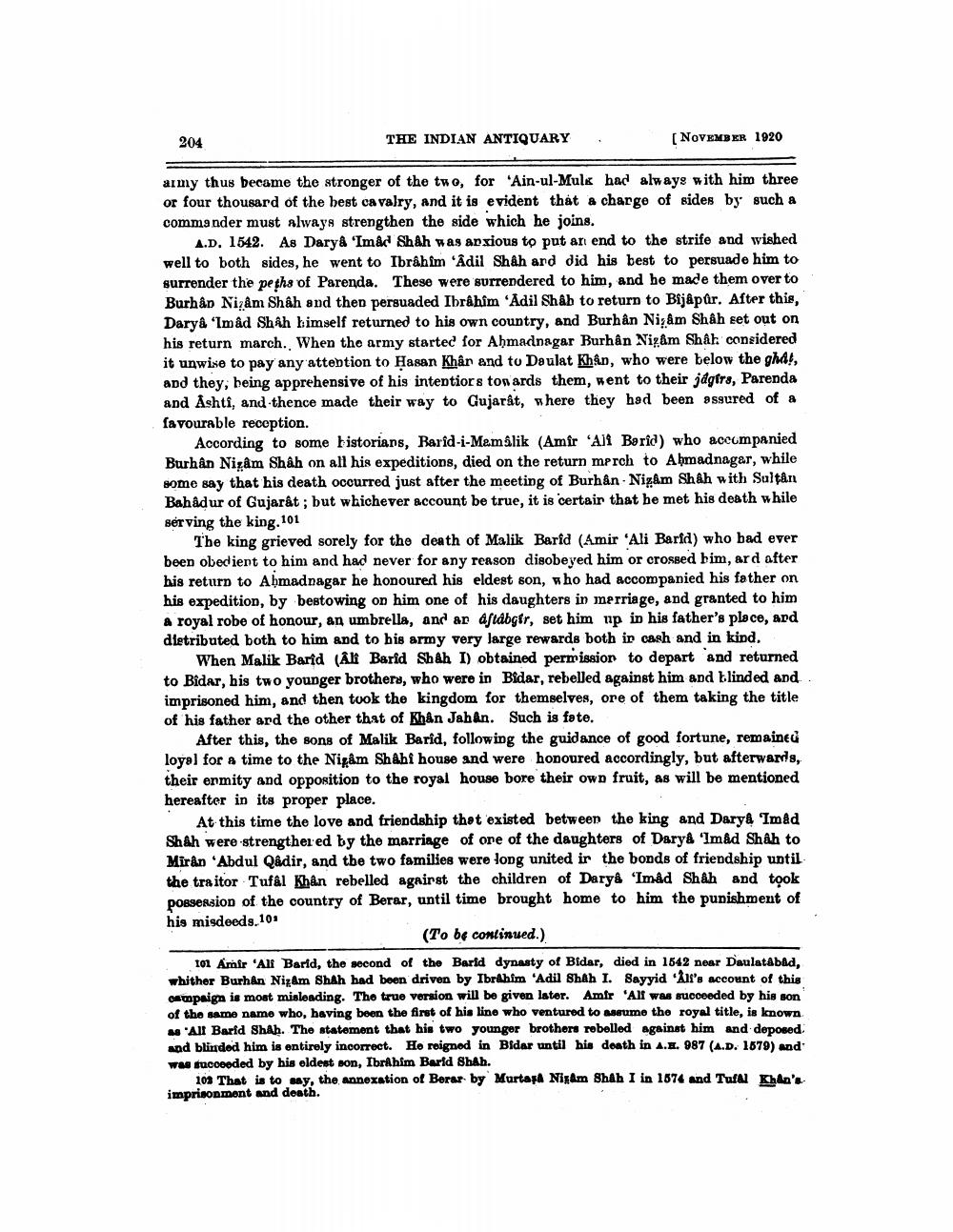________________
204
THE INDIAN ANTIQUARY
.
NOVEMBER 1920
army thus became the stronger of the two, for 'Ain-ul-Mulk had always with him three or four thousard of the best cavalry, and it is evident that a charge of sides by such a commander must always strengthen the side which he joins.
A.D. 1542. As Daryå 'Imac ShAh was anxious to put an end to the strife and wished well to both sides, he went to Ibrahim 'Adil Shah and did his best to persuade him to surrender the pephs of Parenda. These were surrendered to him, and he made them over to Burhåp Nizam Shah and then persuaded Ibrâhîm 'Adil Shâb to return to Bijapur. After this, Darya 'Imad ShAh himself returned to his own country, and Burhan Nigam Shah set out on his return march. When the army started for Ahmadnagar Burhan Niyam Shah considered it unwise to pay any attention to Hasan Khân and to Daulat Khân, who were below the ghal, and they, being apprehensive of his intentiors ton ards them, went to their jagfrs, Parenda and Ashti, and thence made their way to Gujarat, where they had been assured of a favourable reception.
According to some historians, Barîd-i-Mamálik (Amîr 'Ali Berid) who acecmpanied Burhan Nizam Shah on all his expeditions, died on the return merch to Ahmadnagar, while some say that his death occurred just after the meeting of Burhan Nigam Shah with Sultan Bahadur of Gujarat ; but whichever account be true, it is certain that be met his death while serving the king 101
The king grieved sorely for the death of Malik Barid (Amir 'Ali Barid) who bad ever been obedient to him and had never for any reason disobeyed him or crossed him, ard after his return to Abmadnagar he honoured his eldest son, who had accompanied his father on his expedition, by bestowing on him one of his daughters in merriage, and granted to him A royal robe of honour, an umbrella, and an aftábgér, set him up in his father's place, and dletributed both to him and to his army very large rewards both in cash and in kind.
When Malik Barid (Al Barid Shah I) obtained permission to depart and returned to Bidar, his two younger brothers, who were in Bidar, rebelled against him and blinded and imprisoned him, and then took the kingdom for themselves, ore of them taking the title of his father ard the other that of Khan Jahan. Such is føte.
After this, the sons of Malik Barid, following the guidance of good fortune, remained loyal for a time to the Nigam ShAhi house and were honoured accordingly, but afterwards, their enmity and opposition to the royal house bore their own fruit, as will be mentioned hereafter in its proper place.
At this time the love and friendship that existed between the king and Darya 'Imad Shah were strengther ed by the marriage of one of the daughters of Darya 'Imad Shah to Miran 'Abdul Qadir, and the two families were long united ir the bonds of friendship until the traitor Tufal Khan rebelled agrirst the children of Daryå 'Imad Shah and took possession of the country of Berar, until time brought home to him the punishment of his misdeeds. 101
(To be continued.)
101 Amir 'Ali Barld, the second of the Barid dynasty of Bidar, died in 1642 near Daulatabad, whither Burhan Nizam Shah had been driven by Ibrahim 'Adil ShAh I. Sayyid Ali's account of this ampaign is most misleading. The true version will be given later. Amfr 'Alf was succeeded by his son of the same namo who, having been the first of his line who ventured to assume the royal title, is known M'Al Bard Shah. The statement that his two younger brothers rebelled against him and deposed and blinded him is entirely incorrect. Ho reigned in Bidar until his death in A.x. 987 (A.D. 1879) and was fucoooded by his oldest son, Ibrahim Barid Shah.
103 That is to say, the annexation of Berar by Murtad Nizam Shah I in 1674 and Tufal Khan's imprisonment and death.




